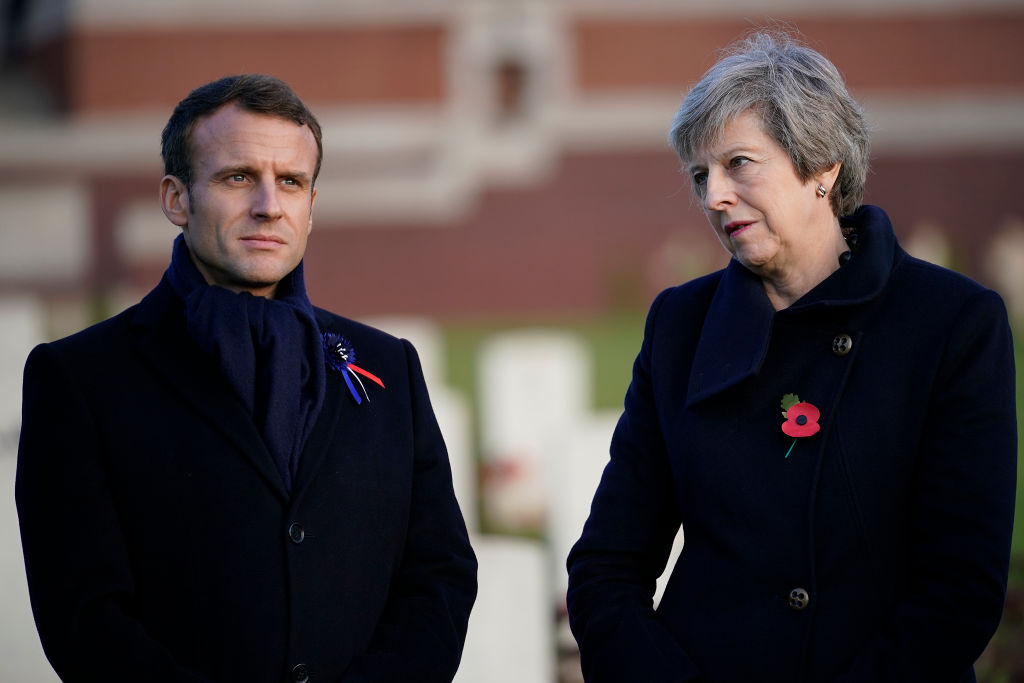Why is Emmanuel Macron raging against Britain? The French president has returned to the subject of the British once again in the course of his Great National Debate. To be honest, thus far this has been something of a great Macron soliloquy, as he finds it difficult to stop talking. It was inevitable that during one of his lengthy televised discourses (there have now been three) he would turn once again to his new favourite subject, and so he did.
As he strutted across the stage in Drôme, holding forth to an audience of local worthies that looked more bemused than enthusiastic, Macron declared that the British were mad, their referendum proof that referendums are rubbish, that Brexit is unachievable, that the British notion of independence from the EU was demented, and that British society was tearing itself apart. This, apropos of Macron’s belief in the EU, and only the EU, as the ultimate guarantor of security and freedom.
We can put to one side the irony that in Brexit Britain, police are not yet firing gas cylinders at rioters burning bankers’ Porsches, although defacement of national memorials seems a tale of two cities. Also, allow me to note personally the absolute lack of resonance of this message, in la France profonde. There is keen interest here in France’s meeting with England in the Six Nations on February 10. Macron’s rant, not so much.
The question naturally arises: why does Macron hate the British so much?
He has form. Throughout the Brexit talks he has always taken an aggressive, confrontational attitude. Partnership seemed never to be on offer. If Britain chose to obstruct ever-closer union, and declined to accept Franco-German hegemony in the EU, it would suffer. During his presidential campaign he stood outside Downing Street, where he’d been received by May, and promised a red carpet for bankers leaving the City for Paris. (Few have heeded his call.)
He has spoken of the need for a new strategic relationship with the UK. But he has never suggested this might be cooperative and constructive. Indeed, after promising that such a relationship should be defined, he has not returned to the subject at all. He has been preoccupied with France’s relationship with Germany, and his personal concorde with Angela Merkel, which culminated in the recent signing of the latest bilateral declaration of undying mutual fealty. If he has thanked the British armed forces for their support of French anti-terrorism operations in Africa, I have yet to hear it.
Many metaphors have been groped for to describe the phenomenon of Emmanuel Macron, who became president of France two years ago in circumstances that are still somewhat obscure. He was never wildly popular, but his apparent moderation gave him a decisive advantage over Marine Le Pen in the second round of the 2017 presidential election.
He then won an enormous majority in the national assembly, again practically by default, as if the electoral system had been designed for him. His political enemies utterly vanquished, it seemed the future belonged to Macron, until it didn’t, 10 weeks ago, with the swarming of the yellow jackets after the wonder president lowered taxes on the rich and raised them on the poor, simultaneously.
Macron has famously compared himself to Jupiter, king of the Gods. Others have suggested he resembles Louis XIV, the Sun King. Macron certainly enjoys holding court at the Palace of Versailles. Napoleon III has also been proposed as a role model, drawing from Macron’s imperial and literary pretensions and grandiosity. It seems that Macron might have numerous inspirations.
But say it quietly, perhaps the French political personality whom Macron most resembles is maréchal Philippe Pétain. Pétain was a hero when he took over the residue of the French state, evicted by Hitler from Paris. With the help of able young functionaries like François Mitterrand, Pétain was extremely popular in France. Tens of thousands cheered him, until De Gaulle showed up, in an American truck, at which point they cheered De Gaulle.
Duplicity was a hallmark of Vichy and its parallels are visible in Macron’s France. A cult of personality around the leader, a compliant media, muscular police action against political opponents. Today in France, Macron aided by his friends at BFMTV, are fighting back. The Gilets Jaunes have been pushed off the roundabouts. Dozens have been arrested. A squad of Macron supporters on social media robotically applaud Macron’s every move and pronouncement. Some of the rote praise for Macron is practically North Korean. Britain’s problems are just part of the theatre.
There is a difference between Pétain and Macron however. Pétain was seen in public, even late in his regime. Macron has not dared show his face since well before Christmas, to anyone who has not been through a screening machine.
Jonathan Miller is the author of France a Nation on the Verge of a Nervous Breakdown (Gibson Square). He tweets at @lefoudubaron






Comments